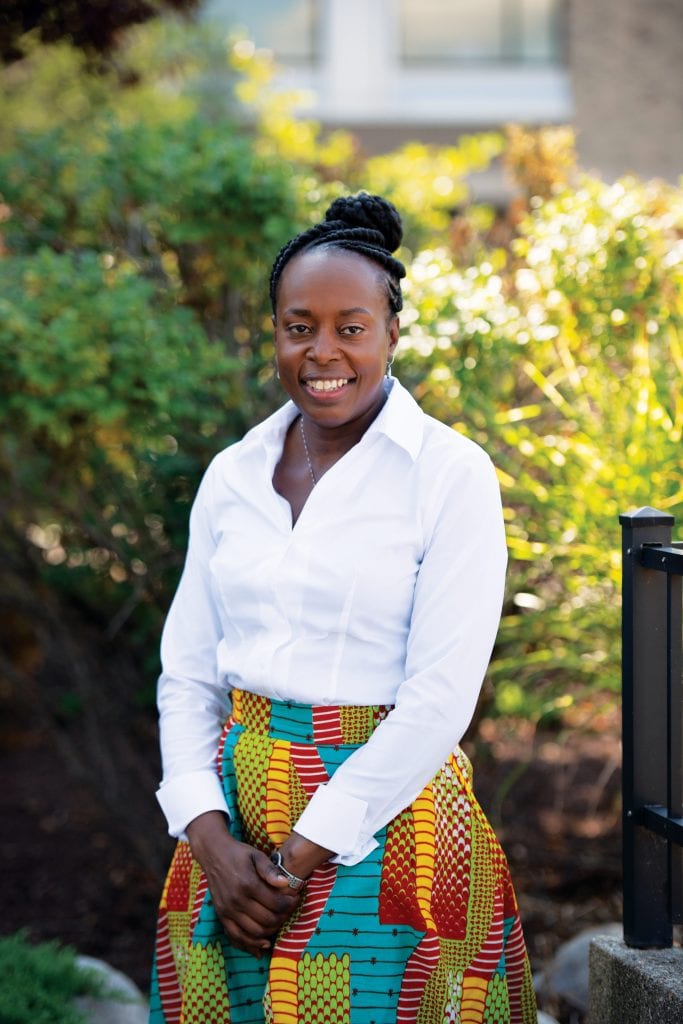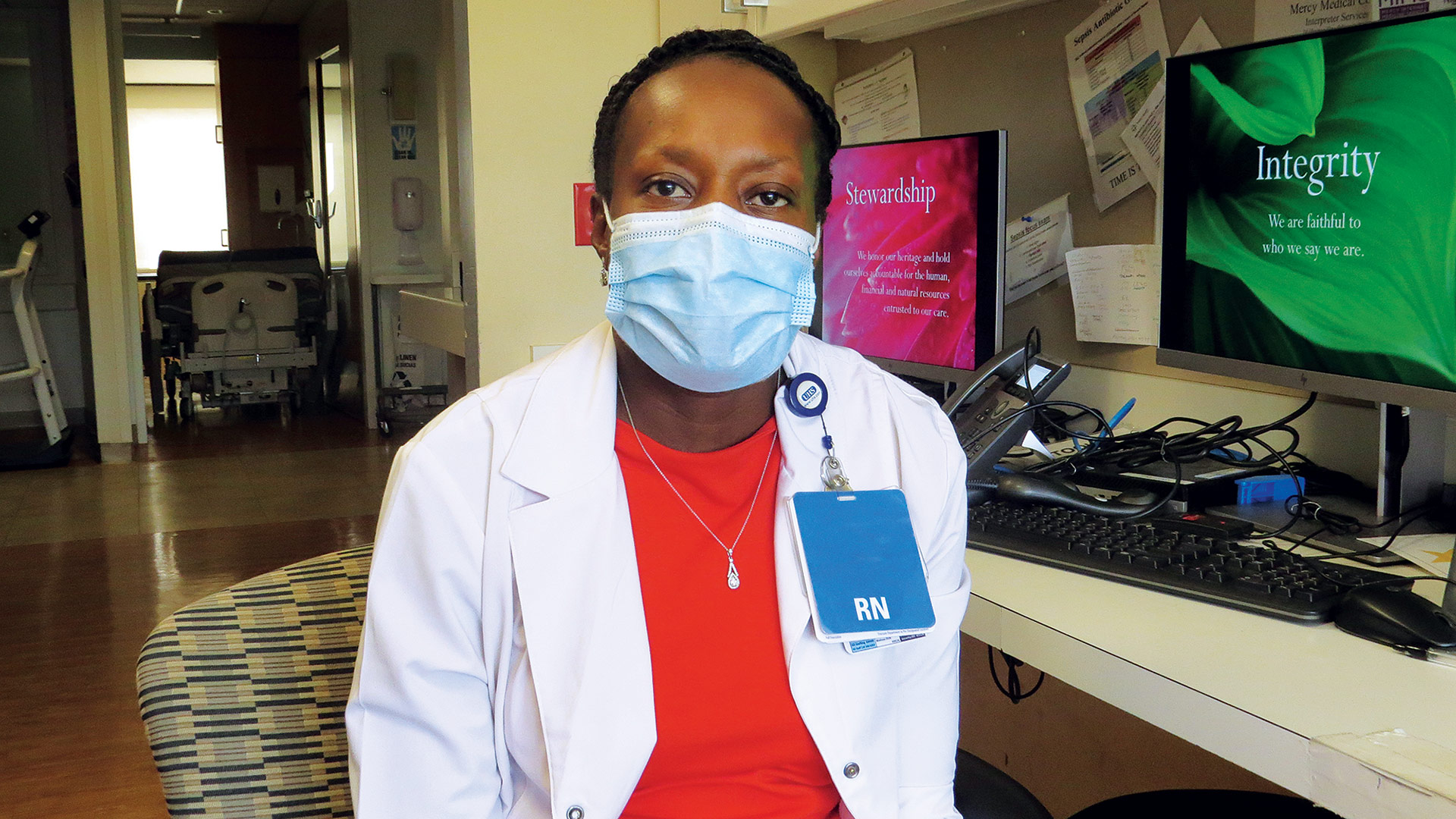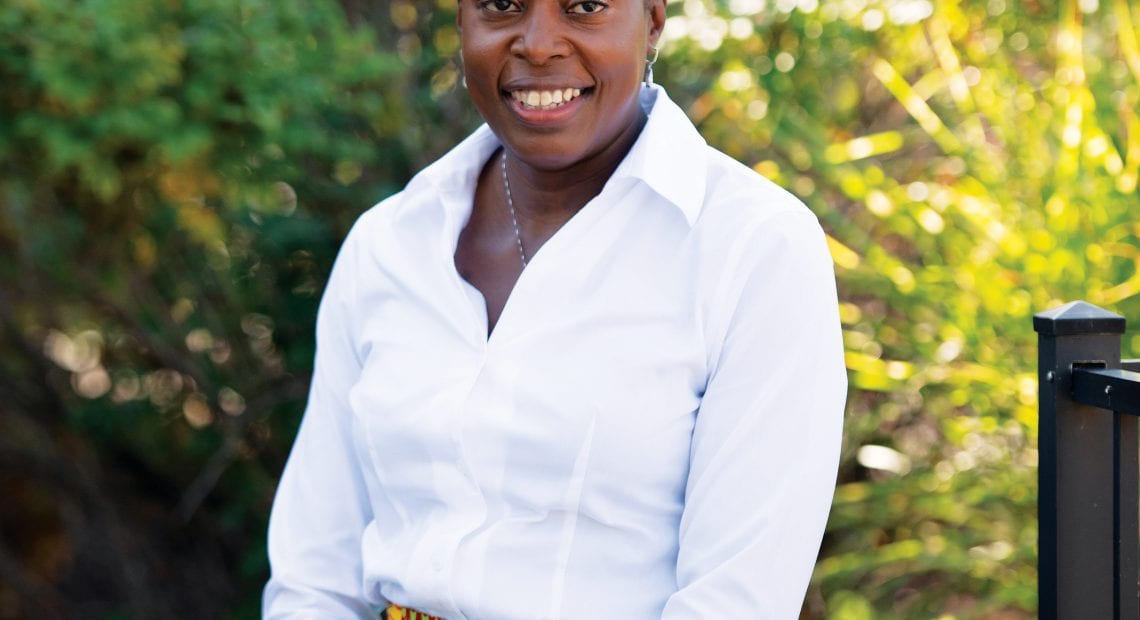This Administrator Has Become a Calming Voice in the Midst of the Pandemic

Maggie Eboso
Maggie Eboso was in the grocery store when the first text message came in on the evening of March 26.
Soon, there were three more, and as her phone kept pinging, it became increasingly clear that her job as Infection Control coordinator at Mercy Medical Center was about to change substantially, and that she and the hospital were entering uncharted waters.
Indeed, the first suspected COVID-19 patients — two young women who had recently returned to the area from China — had arrived at Mercy, and there were questions that needed to be answered. Lots of them.
So began an ultra-intense period that has tested Eboso in all kinds of ways, but also taken her career to a new and different plane, one in which she has emerged as a Healthcare Hero.
Those frantic first days would set the tone for the weeks and months to come, during which Eboso would take on a number of responsibilities, many of them new — from coaching staff on the proper use of personal protective equipment (PPE) to helping all those at the hospital navigate a rough sea of changing guidelines and constantly changing information; from advocating for adequate supplies of PPE and working with colleagues to be good stewards of that precious equipment to providing a much-needed sense of calm amid a crisis unlike anything Mercy had seen before.
Her work during the early stages of the pandemic took her to every corner of the hospital, and also far outside its walls. Indeed, she taught PPE donning and doffing, hand hygiene, and infection-control practices to staff at the Hampden County Correctional Center in Ludlow.
Summing it all up, she said this has been a learning experience — one that is very much ongoing, and one that has helped her personally and professionally in innumerable ways.
“I’m a better nurse, and I’ve grown my knowledge base,” she explained. “And I now have a closer working relationship with many of the people here. Initially, I was joking that, when COVID is done, I’m going to change my cell-phone number and disable Halo [a messaging system used in healthcare] on my phone, because of all those calls I was getting. But through all those conversations and close meetings, we’ve become closer and have stronger relationships.”
Turning back the clock several years, Eboso said she took a somewhat winding route to her role as Infection Control and Prevention coordinator.
She came to this country from Kenya with the intention of studying business, but quickly segued into healthcare at Springfield Technical Community College and soon landed a summer internship at Mercy. When it was over, she was asked if she wanted to stay on as a nurse’s aide, and replied with a strong ‘absolutely.’ In many ways, she’s never left.
She went from nurse’s aide to nurse to clinical nurse supervisor to administrative nursing supervisor on weekend nights, a position that was eventually eliminated in 2015, prompting her to leave the Mercy system for close to a year.
She was offered a chance to return, and remembers the vice president of Nursing offering her her pick of positions.
Eboso chose Infection Control, something she had never done before, but intrigued her. She recalls her husband noting she was a quick study and saying, “If someone offers you an amazing opportunity and you’re not sure you can do it, say ‘yes’ —then learn how to do it later.” He also sent her an inspirational quote from Richard Branson to the same effect.
But no words, from her husband or Branson, could likely have prepared her for what her role became starting early this year, and especially after she started receiving those texts in the supermarket.
“The biggest thing that we saw with this whole thing was the fear. We were all thinking, ‘yes, we’ll take care of you, and we’ll treat you,’ but at the end of the day, we all had families and children that we were going home to. So while, yes, we all signed up for this, and this is what we do, people were still afraid — they wanted assurances that they could do their jobs and still go home and not bring this back to their families.”
They came from the Emergency Department director, the ED charge nurse, and the nurse tending to the patient directly. She put the shopping aside, was at the hospital in 10 minutes, and began addressing a situation that would become a microcosm of all that would come over the ensuing weeks and months.
“We had to call the Department of Public Health and get approval for testing because hospitals couldn’t do the testing themselves,” she explained. “So it was now calling the epidemiologist, waiting for a call back, talking to the physicians and nurse, looking at the patient, and waiting for DPH to call you back.”

Maggie Eboso’s work during the pandemic took her to every corner of Mercy Medical Center — and far beyond its walls.
“Information was changing almost every day,” she went on, while discussing what those first few weeks and months were like. “So as you’re building systems into your computer, you’re writing policies and going out in front of your staff to educate them on the new and updated information — and that was happening sometimes several times a week.”
One of her primary roles focused on educating staff on how to use PPE and become good stewards of that equipment, but also to help them separate fact from conjecture or assumption on what equipment was needed and, above all, how to keep themselves and their families safe from infection.
“The biggest thing that we saw with this whole thing was the fear,” she explained. “We were all thinking, ‘yes, we’ll take care of you, and we’ll treat you,’ but at the end of the day, we all had families and children that we were going home to. So while, yes, we all signed up for this, and this is what we do, people were still afraid — they wanted assurances that they could do their jobs and still go home and not bring this back to their families.”
And the onslaught of information coming from the media certainly didn’t help, she went on, because this information was often contradicting what she and others were telling staff members.
“When we told them, ‘all you need is a regular mask,’ they’d see people on TV wearing haz-mat suits, and they would ask, ‘why are they wearing haz-mat suits, and all you’re giving us is a mask?’ she recalled, adding that was this was just one of many “clashes and contradictions,” as she called them, that had to be dealt with.
“We had to call the Department of Public Health and get approval for testing because hospitals couldn’t do the testing themselves. So it was now calling the epidemiologist, waiting for a call back, talking to the physicians and nurse, looking at the patient, and waiting for DPH to call you back.”
While taking on this role of educator within the medical center, she also carried it out within the community as well, including several visits to the correctional facility in Ludlow, where she provided lessons in everything from how gloves provide a false sense of security — that’s why hand washing is still very important — to how to don and doff PPE.
Today, one of her concerns involves battling complacency and what she and many others are now calling “battle fatigue” — both inside the medical center and within the larger community.
She used the nurses’ lounges at Mercy as an example. “People are tired … people want to celebrate a birthday with a cake or share a pizza; they want to eat lunch with their friends,” she explained, adding that it’s part of her job to keep these employees diligent — and safe — by keeping the numbers down in those lounges and making sure there is adequate social distancing.
She joked that people are wary of even thinking about letting their guard down because, if and when they do, “Maggie will be walking in the door at just that moment.”
That mindset, real or not, is just one of many ways of explaining why she has become a Healthcare Hero during this very challenging year.
George O’Brien can be reached at [email protected]





